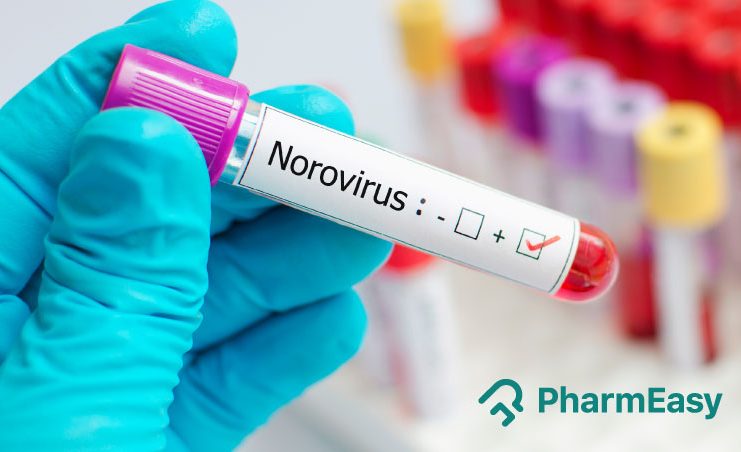Norovirus: Symptoms, Causes, Risk Factors And Preventive Measures
By Dr. Nikita Toshi +2 more

Get,

to manage your symptom
Get your,


4 Cr+ families
benefitted

OTP sent to 9988776655



You’ve successfully subscribed to receive
doctor-approved tips on
Whatsapp

Get ready to feel your best.

Hi There,
Download the PharmEasy App now!!


Register to Avail the Offer
Send OTPBy continuing, you agree with our Privacy Policy and Terms and Conditions

Hi There,
Sign up on PharmEasy now!!
Trusted by 4 crore+ families

OTP sent to 9988776655



You have unlocked 25% off on medicines




Code: NU25
By Dr. Nikita Toshi +2 more
Table of Contents
The news of the Norovirus outbreak has been in circulation for some time now. The outbreak has been on the global scale mostly, but recently it has hit close to home with two confirmed cases of Norovirus infection in Kerala, as of January 24th reports. With so much attention given to this virus, it is important to understand what the virus is capable of doing in order to be able to fight it better.

Firstly, norovirus is not a new virus and it has been circulating among us for nearly half a century now. Secondly, the virus is held to be one of the causes of gastroenteritis or stomach flu. Thirdly, norovirus is capable of surviving in cold temperatures, so it is more common in cold countries and during the winter months. As per another report, it was found that the norovirus infection was more noticeable in high-income countries. In India, however, cases were reported in shared food environments, such as hostels and schools.
With cases gradually on the rise in India, let us explore a little more details about the norovirus infection so that we are able to tackle the infection as aware citizens.
In the opinion of experts, the infection has a high possibility of spreading in crowded and closed spaces where there is close contact with a person who is infected with the virus. Even after the infected person has left the spot, the virus continues to thrive on objects and surfaces for weeks and days. Some other causes of the norovirus are:
The symptoms usually start suddenly and can include the following:
You are likely to experience symptoms 12-48 hours post your exposure to the norovirus infection. In some cases, the infected person may appear asymptomatic (not showing any signs at all). However, they are still highly contagious and can spread the infection to others when in contact.
Sometimes norovirus causes no symptoms, but infected people can still pass the virus to others. A child with a norovirus infection who has a lot of diarrhea and vomiting can get dehydrated and feel lightheaded or dizzy.
Dr. Ashish Bajaj, M.B.B.S., M.D. in Clinical Pharmacology and Toxicology
Norovirus infection can clear up in a few days and is not usually life-threatening. But in young children, older adults, pregnant women and those with a weak immune system, the effects of the infection can be severe and even pose a risk to someone’s life. Some warning indications are listed below:
Knowing your risk factors can keep you protected from falling ill and suffering from uncomfortable symptoms.
There is no mystery about the fact that norovirus can cause a highly contagious infection. The only way to keep yourself safe is by practising safe hygiene habits:
In order to prevent the virus from spreading if you have already been infected, here is what you should do:
The article helps us to understand the various aspects of norovirus infection and we can gather that by following a few preventive steps, we can keep ourselves protected and stop the spread. If you develop symptoms of persistent diarrhoea, along with severe dehydration, you must contact your doctor right away, start your treatment and take adequate rest at home to maintain isolation for at least one week. Among other things, you can spread your knowledge about the virus amongst your loved ones and collectively stay vigilant.
Disclaimer: The information provided here is for educational/awareness purposes only and is not intended to be a substitute for medical treatment by a healthcare professional and should not be relied upon to diagnose or treat any medical condition. The reader should consult a registered medical practitioner to determine the appropriateness of the information and before consuming any medication. PharmEasy does not provide any guarantee or warranty (express or implied) regarding the accuracy, adequacy, completeness, legality, reliability or usefulness of the information; and disclaims any liability arising thereof.
Links and product recommendations in the information provided here are advertisements of third-party products available on the website. PharmEasy does not make any representation on the accuracy or suitability of such products/services. Advertisements do not influence the editorial decisions or content. The information in this blog is subject to change without notice. The authors and administrators reserve the right to modify, add, or remove content without notification. It is your responsibility to review this disclaimer regularly for any changes.

Leave your comment...
Comments